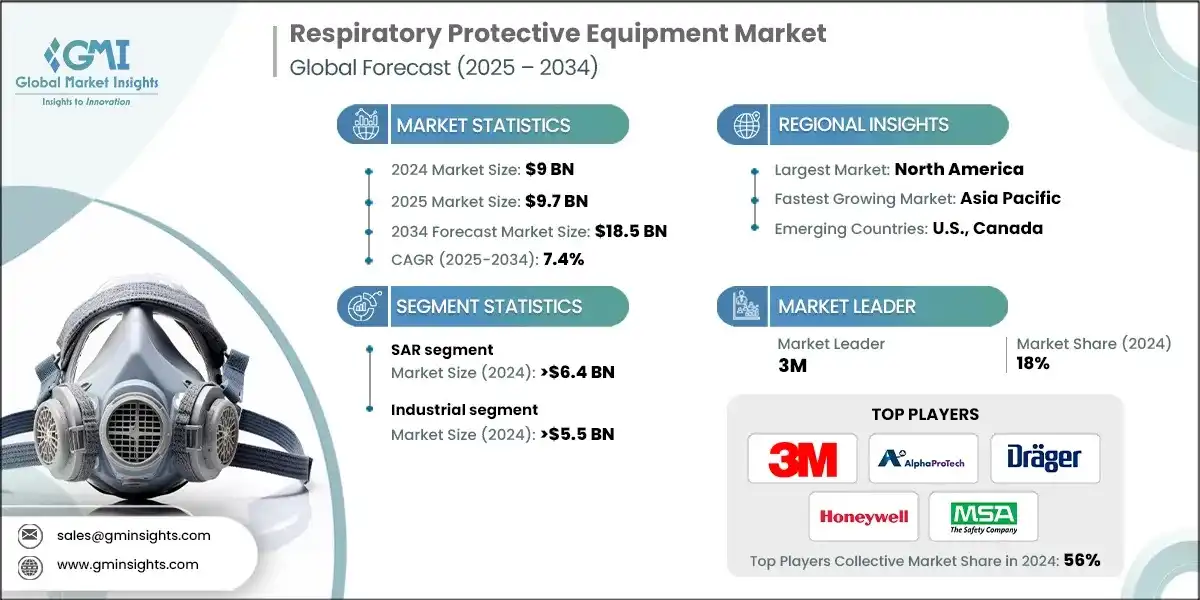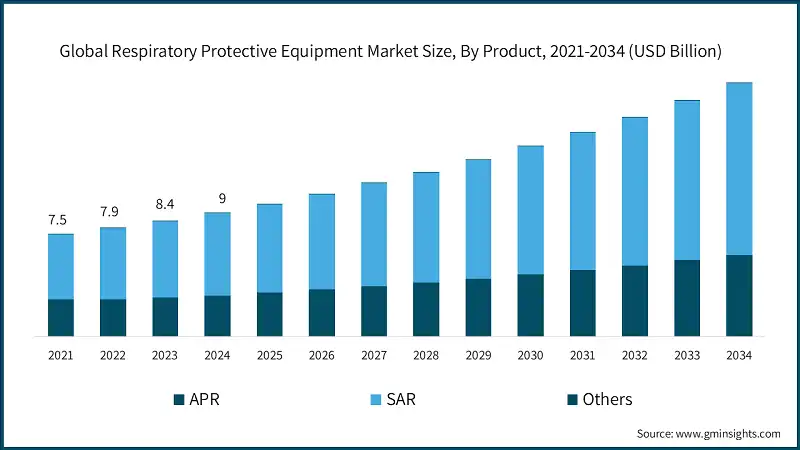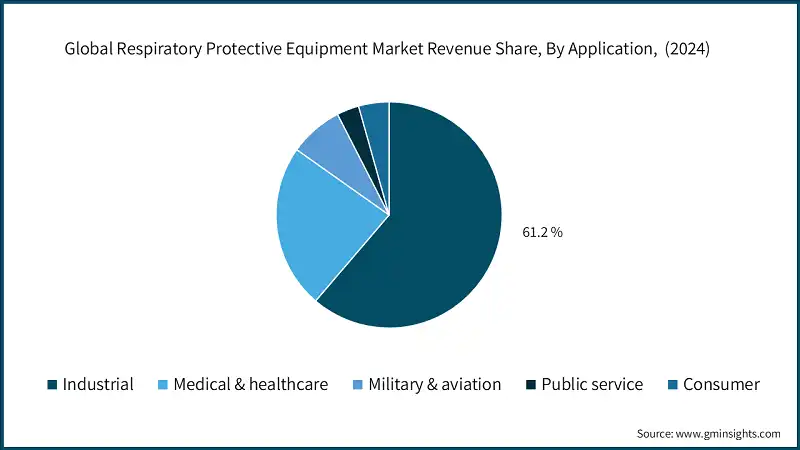Summary
Table of Content

Respiratory Protective Equipment Market
Get a free sample of this report
Form submitted successfully!
Error submitting form. Please try again.
Thank you!
Your inquiry has been received. Our team will reach out to you with the required details via email. To ensure that you don't miss their response, kindly remember to check your spam folder as well!

Request Sectional Data
Thank you!
Your inquiry has been received. Our team will reach out to you with the required details via email. To ensure that you don't miss their response, kindly remember to check your spam folder as well!
Form submitted successfully!
Error submitting form. Please try again.
Respiratory Protective Equipment Market Size
The respiratory protective equipment market was estimated at USD 9 billion in 2024. The market is expected to grow from USD 9.7 billion in 2025 to USD 18.5 billion in 2034, at a CAGR of 7.4% according to the latest report published by Global Market Insights Inc.

To get key market trends
- Respiratory protective equipment (RPE) refers to the devices that prevent dust, fumes, vapors, and infectious agents from inhalation. These products play a vital role in healthcare, construction, manufacturing, and emergency service sectors. Market growth is driven by increased awareness of occupational health hazards and strict adherence to safety measures, as well as rapid increases in the number of people suffering from respiratory diseases.
- Market segmentation of the RPE sector mainly includes air-purifying respirators (APRs) and atmosphere-supplying respirators (ASRs). The APRs are the more widely used type of respirator due to their cost effectiveness as well as their efficiency in filtering airborne contaminants. ASRs are supplied air respirators employed in an area with a toxic atmosphere or low levels of oxygen, affording a higher level of protection. With increasing employment in healthcare environments, the benefit of maximum comfort with a PAPRs for extended use, along with no requirement for fit testing, makes it a suitable option for a heterogeneous workforce.
- Emerging technologies are deeply impacting the RPE market. Developments such as smart real-time monitoring airborne quality sensors, Bluetooth connectivity for data logging, and recyclable materials are adding value and sustainability to respiratory protective devices. Companies have been innovating next-generation respirators, offering enhanced comfort features besides environmental considerations linked to the growing needs of advanced yet environmentally friendly protective equipment.
- Healthcare industry showed the need for respiratory protection equipment to prevent the transmission of airborne pathogens through the air after the COVID-19 pandemic. Similarly, workers in construction and mining are exposed to hazardous dust and fumes requiring adequate respiratory protection to prevent risks to health.
- For instance, UAE became the first in the Gulf region to manufacture and export its own N95 masks in collaboration with Mubadalas Strata Manufacturing and the multinational company Honeywell as a measure against the COVID-19 pandemic. Established within the Al Ain facility, which has an annual capacity of over 30 billion masks, the production line's intended purpose is to fulfill the immediate national demand for an increased supply of respiratory protective equipment as well as strengthening supply chain viability. Respiratory Protective Equipment Market Report Attributes
Key Takeaway Details Market Size & Growth Base Year 2024 Market Size in 2024 USD 9 Billion Market Size in 2025 USD 9.7 Billion Forecast Period 2025 - 2034 CAGR 7.4 % Market Size in 2034 USD 18.5 Billion Key Market Trends Drivers Impact Rising health awareness Growing concerns about air pollution, occupational hazards, and respiratory diseases have significantly increased demand for respiratory protective equipment. People and organizations are prioritizing health safety more than ever, driving steady market growth and encouraging manufacturers to develop user-friendly, effective solutions. Shift toward reusable respirators There is a notable shift from disposable masks to reusable and powered air-purifying respirators (PAPRs) due to environmental concerns and cost efficiency. This trend supports sustainable practices and long-term safety, leading to higher adoption rates especially in healthcare and industrial sectors. Integration of smart technologies The adoption of smart sensors, real-time air quality monitoring, and connectivity features in respirators is enhancing their effectiveness and user experience. These innovations help in better compliance and safety management, fueling market growth through tech-driven differentiation. Focus on comfort and ergonomics Manufacturers are placing greater emphasis on ergonomics, lightweight materials, and breathability to improve wearer comfort during prolonged use. This focus enhances user compliance and satisfaction, directly boosting market demand across sectors requiring long-duration respirator use. Pitfalls & Challenges Impact Supply chain disruptions Global disruptions in raw materials and manufacturing, often exacerbated by geopolitical tensions or pandemics, impact timely availability of quality RPE products. Such supply challenges cause fluctuations in market stability and delay fulfilling urgent demands. High equipment costs Advanced respiratory devices with enhanced features often come with steep prices, limiting affordability for smaller enterprises and emerging markets. This cost barrier slows adoption despite rising awareness, restricting market penetration in price-sensitive regions. Market Leaders (2024) Market Leaders - 3M
18% market shareTop Players - Mine Safety Appliances (MSA)
- Honeywell International Inc.
- Drägerwerk AG & Co. KGaA
- Alpha Pro Tech
- 3M
Mine Safety Appliances (MSA) Collective market share in 2024 is 56%Competitive Edge - The competitive edge is driven by strong global presence, continuous innovation in technology, development of eco-friendly products, and rising demand across healthcare and industrial sectors worldwide.
Regional Insights Largest Market North America Fastest growing market Asia Pacific Emerging countries U.S., Canada Future outlook - The steady growth of the respiratory protective equipment market is fueled by increasing global emphasis on sustainability, with manufacturers focusing on eco-friendly and reusable products. Strict safety regulations worldwide are compelling industries to prioritize respiratory protection, driving consistent adoption across sectors. Additionally, rising awareness of respiratory health risks and expanding industrialization in emerging markets are boosting demand. Looking ahead, the market is expected to grow steadily as innovation, regulatory compliance, and environmental considerations continue to shape purchasing decisions globally.
What are the growth opportunities in this market?
Respiratory Protective Equipment Market Trends
- The global respiratory protective equipment sector is undergoing rapid changes due to increasing health awareness worldwide. Issues such as air pollution, work-related hazards, and long-term effects of pandemics constitute prime respiratory safety considerations for both individuals and organizations. Thus, there is an increased focus on effective protective gear, especially public adoption which is accelerated by the COVID-19 pandemic and thus created a new baseline in its evolution.
- The emerging use of smart technologies is augmented in personal protective equipment. Incorporated sensors in respiratory protection devices now create a real-time monitoring network for air quality, breathing resistance, and filter condition. Smart respirators in automotive factories warn workers and their supervisors upon clogging of filters or even when exposure levels reach a critical point. Such additional access to insights creates greater confidence in the equipment and promotes regular use, thus furthering demand across high-risk work environments.
- The evolution of the interface between respirator protection equipment (RPE) and workplace safety systems has occurred. Safety managers now have digital dashboards designed to track respirator compliance and maintenance. In warehouses and plants dealing in chemicals, supervisors now receive alerts whenever an employee does not use the mask properly or is under dangerous conditions. This real-time monitoring not only prevents accidents but also aids safety audits, adding value for users to invest in better respiratory systems as well.
- Reusable respirators drive the market of respiratory protective equipment by offering both sustainability goals and long-term cost savings. Powered air-purifying respirators (PAPRs) offer longer service life and reduce the need for frequent replacement, and these factors are driving demand in healthcare and manufacturing industries over single use mask. This change supports environmental responsibility and contributes to overall market growth by making respirators a strategic, long-term investment.
- Rising concerns about comfort and ergonomics, since acceptance by the wearer depends on comfort under real conditions of extended use, also shape the market.
- The market has changed considerably due to the evolving regulatory framework for the global push toward sustainability. Governments have tightened safety standards especially in Europe and parts of Asia, where governments now require stricter fit-testing, documentation, and certification for RPE used in both industrial and public settings with stricter compliance.
Respiratory Protective Equipment Market Analysis

Learn more about the key segments shaping this market
Based on product, market is divided into APR, SAR and Others. The SAR segment crossed USD 6.4 billion in 2024 and is expected to grow at a CAGR of over 7.6% through 2034.
- Air Purifying Respirator (APR) segments feature growth across all product segments due to increasing adoption in environments such as manufacturing, pharmaceuticals, and construction industries where employees frequently meet airborne particles, dust, and chemical fumes have been the major factor behind this surge.
- The preference of APRs, mainly reusables like half-mask and full-face respirators, is because of the operational cost and flexibility of use in multiple work environments. Such workplace conditions also include increased industrial automation, which added much more particulates to confined spaces, making APRs frontline defense against unsafe working conditions. Electronics manufacturing environments in Southeast Asia are using APRs because these respirators afford filtration of fine particulate matter without the burden of sophisticated support systems.
- Supplied-Air Respirators (SAR) are usually slow-growing in very specialized areas such as confined spaces, hazardous chemistry, and firefighting environments. This means that, while SARs offer superior protection, the airlines through which they are supplied and their much greater maintenance make them less user friendly for day-to-day use in an industrial setting.
- The "Others" category showed temporary growth during health emergencies but are settling down as industries switch into more sustainable and, in many cases, reusable options. APRs have overall practical versatility and lower cost of ownership along with wide adaptability among sectors, making them the dominators in the product segmentation of the respiratory protective equipment market.

Learn more about the key segments shaping this market
Based on application, industrial, medical & healthcare, military & aviation, public service and consumer. The industrial segment exceeded USD 5.5 billion in 2024.
- The primary driver for growth is the industrial segment. Industries such as manufacturing, mining, oil and gas, and construction are increasingly being regulated, causing companies to put workplace safety first by investing in high-quality respiratory protection. There is high demand in this segment for reusable air-purifying respirators because they are relatively cost-effective and flexible for use in dusty or chemically exposed environments.
- Other segments include medicine and healthcare, military and aviation, public service, and consumer, however, their growth dynamics vary as per their significant roles. Health care was boosted by the pandemic as infection control was critical. Both military and aviation applications require such high specification equipment to be used in low-oxygen and toxin environments. Public service sectors, including firefighting and emergency response, see steady increases due to dangerous exposure. Consumer demand will rise in cities facing pollution issues or wildfires.

Looking for region specific data?
North America Respiratory Protective Equipment Market U.S. dominated respiratory protective equipment industry in North America with around 86.5% share and generated USD 2.7 billion revenue in 2024. The Germany market is expected to experience significant and promising growth from 2025 to 2034. The China market is expected to experience significant and promising growth from 2025 to 2034. The UAE market is expected to experience significant and promising growth from 2025 to 2034. The Brazil market is expected to experience significant and promising growth from 2025 to 2034. Major players operating in respiratory protective equipment industry are: 3M imports is a global leader in terms of respiratory-protecting devices, recognized for its wide range of N95 respirators, reusable half and full-face masks, and powered air purifying respirators, among other specific industrial use. Focused on filtration technology, comfort, and fit, 3M respirators find application in various industries, including health care, construction, and manufacturing. Lightweight and ergonomic design innovations 3M develops help meet changing regulations and ergonomic demands in the workplace worldwide. Alpha Pro Tech makes disposable protective clothing, mostly high-filtration surgical masks, and particulate respirators for healthcare and industrial applications. The company is heavily focused on US-based manufacturing and has a reputation for being highly responsive to fulfilling higher demand during pandemic situations. Its products meet FDA and NIOSH, emphasizing maximal breathability with protection. Alpha Pro Tech caters mainly to hospitals, labs, and cleanroom environments. Dräger is a German company for safety technology, highly regarded for its respiratory protection systems of exceptionally high performance, particularly in hazardous industrial and emergency scenarios. The company supplies advanced full-faced masks, escape hoods, and PAPRs in accordance with European and international standards. Dräger's products find application in firefighting, mining, chemical handling, and other high-risk activities that call for durable and technically superior equipment. They focus on safety, comfort, and reusability. Honeywell's respiratory protective equipment portfolio includes disposable masks, reusable respirators, and powered air systems. They are known for their ability to marry technology with safety. Honeywell's respirators have specialized features such as moisture-wicking properties, adjustable fit systems, and speech diaphragms integrated into the mask. Honeywell's products are widely used back in aerospace, manufacturing, and energy. With its international logistics and regulatory approvals, it stands out as a trusted RPE partner across multiple environments. The Mine Safety Appliances Company (MSA) specializes in advanced respiratory protection for those who work in high-risk activities such as oil & gas, firefighting, and construction. The company manufactures various products in the air-purifying and respiratory protective equipment (e.g. SCBA, elastomeric facepieces, and PAPRs) that provide maximum protection combined with durability. MSA's constant bid to innovate has led them to integrate digital features such as Bluetooth and telemetry for real-time monitoring, with rugged yet comfortable and regulatory-compliant design being the company description.Europe Respiratory Protective Equipment Market
Asia Pacific Respiratory Protective Equipment Market
Middle East and Africa Respiratory Protective Equipment Market
Latin America Respiratory Protective Equipment Market
Respiratory Protective Equipment Market Share
Respiratory Protective Equipment Market Companies
Respiratory Protective Equipment Market News
The respiratory protective equipment market research report includes in-depth coverage of the industry with estimates & forecasts in terms of revenue (USD Billion) and volume (Units) from 2021 to 2034, for the following segments:
Market, By Product
- APR
- Unpowered
- Disposable filtering half mask
- Reusable half mask
- Full-face mask
- Powered
- Half face mask
- Full-face mask
- Helmets, hoods & visors
- Unpowered
- SAR
- SCBA
- Airline respirator
- Others
Market, By Application
- Industrial
- Medical & healthcare
- Military & aviation
- Public service
- Consumer
The above information is provided for the following regions and countries:
- North America
- U.S.
- Canada
- Europe
- Germany
- UK
- France
- Italy
- Spain
- Rest of Europe
- Asia Pacific
- China
- India
- Japan
- Australia
- South Korea
- Rest of Asia Pacific
- Latin America
- Brazil
- Mexico
- Argentina
- Rest of Latin America
- MEA
- South Africa
- Saudi Arabia
- UAE
- Rest of MEA
Frequently Asked Question(FAQ) :
Who are the key players in the respiratory protective equipment market?
Key players include 3M, Alpha Pro Tech, Drägerwerk AG & Co. KGaA, Honeywell International Inc., and Mine Safety Appliances (MSA).
What are the key trends shaping the respiratory protective equipment market?
Key trends include the integration of smart technologies, a shift toward reusable respirators, and a focus on comfort and ergonomics to enhance user compliance.
Which region leads the respiratory protective equipment market?
The U.S. respiratory protective equipment market, generating USD 2.7 billion revenue in 2024 and holding an 86.5% of the regional revenue share.
What was the valuation of the industrial segment in 2024?
The industrial segment exceeded USD 5.5 billion in 2024, supported by increasing regulations and demand for workplace safety.
How much revenue did the SAR segment generate in 2024?
The SAR segment generated USD 6.4 billion in 2024 and is expected to grow at a CAGR of over 7.6% through 2034.
What was the market size of the respiratory protective equipment in 2024?
The market size was USD 9 billion in 2024, with a CAGR of 7.4% expected through 2034 driven by rising awareness of occupational health hazards and increasing cases of respiratory diseases.
What is the expected market size of the respiratory protective equipment market in 2025?
The market size is projected to reach USD 9.7 billion in 2025.
What is the projected value of the respiratory protective equipment market by 2034?
The market is expected to reach USD 18.5 billion by 2034, propelled by rising health awareness, safety compliance, and increasing respiratory disease cases.
Respiratory Protective Equipment Market Scope
Related Reports


